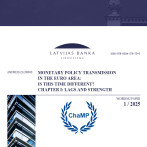Non-cash currency continues to replace banknotes and coins in circulation
Non-cash currency continues to replace banknotes and coins in circulation
In 2009 the volume of cash in circulation decreased by 22.6% amounting to 788.2 million lats on January 1, 2010.
A substantially reduced demand for cash currency in 2009 was determined by several factors. For several years, the main factor effecting the decrease in the volume of cash currency in circulation is the expanded use of non-cash currency and the percentage of cash currency in broad money continues to contract. In 2009, it decreased from 14.3% at the beginning of the year to 11.4% by its end
Thus the most important role in total money was played by deposits with banks whose annual increase amounted to 2%. It is worth noting that over a longer period of time, settlements in non-cash currency instead of cash, have increased several times: e.g., the percentage of population that have a current account has almost tripled from 27% to 78%.
In addition, the demand for cash currency was further diminished by a falling domestic demand and retail turnover. Influenced by the holiday season, the demand for cash, however, increased substantially at the end of the year – by 4.3%. In some months of last year, a switch from lats cash currency to cash foreign currency was observed as a result of nervousness in the financial markets.
731.3 million lats or 92.8% of total money is banknotes and 56.9 million lats or 7.2% are coins.
Textual error
«… …»






